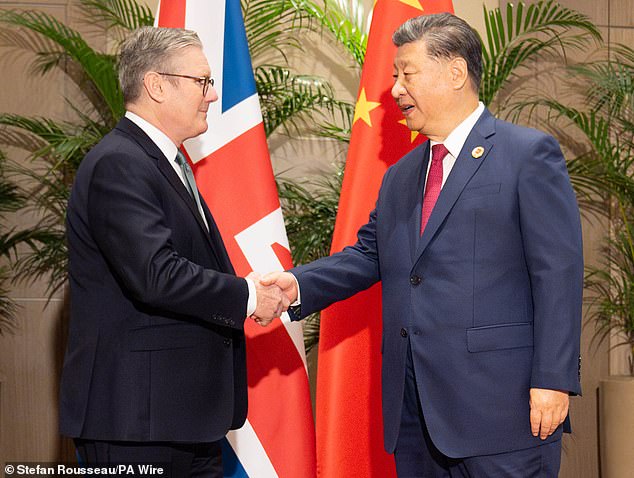The debate over China’s plan to build a vast new embassy complex in central London has erupted once again — and this time, the allegations are even more alarming.
New documents suggest that the proposed “super-embassy” could physically surround one of Britain’s most sensitive communications hubs, prompting fresh warnings from security chiefs and growing political fallout for the Labour government.
Plans Reveal Embassy Surrounding Key UK Telecom Site
Fresh planning documents seen by The Mail on Sunday show that the proposed Chinese embassy would be constructed around the Wapping Telephone Exchange, a highly secure facility managed by BT Openreach.
The site plays a crucial role in providing high-speed fibre optic links to some of the City of London’s biggest financial institutions.
If the plan goes ahead, the embassy would occupy a former Barclays trading floor, housing accommodation for over 200 Chinese diplomats and intelligence officers, making it the largest embassy in Europe.
The surrounding area also contains tunnels running beneath the Thames that have carried fibre cables since the 1980s — a location that intelligence experts warn could be dangerously exposed.
Security Fears Over Espionage and Data Theft
Security sources have raised red flags about the embassy’s proximity to the UK’s communication lines.
Officials claim that Chinese spies have already been tapping into fibre cables across Britain using ultra-thin wires — some as fine as a strand of human hair — to secretly access sensitive data.
“The scale of the risk is hard to overstate,” one insider told reporters. “It’s extremely difficult to detect when these cables are being compromised.”
Even the Bank of England has reportedly voiced concerns about placing a foreign state compound so close to London’s financial nerve centre.
Labour Faces Accusations of a Secret Deal with Beijing
The controversy goes beyond security fears — it’s now turning into a political storm.
Senior figures have accused Prime Minister Sir Keir Starmer of striking a private understanding with Beijing to push the embassy plans through, despite intelligence objections.
The project, initially blocked by the previous Conservative government, was revived after Labour’s election victory last year.
According to insiders, President Xi Jinping personally raised the issue with Chancellor Rachel Reeves during her visit to China in January, where she was seeking new trade agreements.
Critics Say Security Was Sacrificed for Economic Gain
Opposition figures claim Labour is putting national security at risk in its attempt to ease the UK’s financial strain.
Reeves has been accused of “selling out Britain’s safety” to fill a £30 billion gap in public finances.
China’s anger over delays to the embassy approval has only intensified the tension.
When Housing Secretary Steve Reed postponed the final decision until December 10, Beijing reacted furiously — accusing the UK of “disregarding its commitments” and showing “a lack of contractual spirit.”
Espionage Fears Rekindled After Spy Trial Collapse
The row comes just weeks after the collapse of the high-profile China spy trial, in which two men — Christopher Cash and Christopher Berry — were accused of passing secrets to Beijing.
The Crown Prosecution Service dropped the case, saying the evidence failed to prove China was an active threat.
MI5 chief Ken McCallum was reportedly “frustrated” by the outcome, which many in the intelligence community see as undermining the UK’s ability to confront Chinese espionage.
Agencies have also complained about being shut out of the embassy planning process, with key documents heavily redacted — including blueprints showing two basement “spy dungeon” suites and a tunnel that has drawn particular concern.
High-Level Diplomacy and Mounting Costs
Re-routing the sensitive fibre cables near the embassy site would cost UK taxpayers millions — and crucially, any changes would require Chinese approval.
Meanwhile, Sir Oliver Robbins, the top civil servant at the Foreign Office, recently travelled to Beijing to negotiate permission for the construction of a new British embassy there.
Former Downing Street aide Dominic Cummings recalled that, during his time under Boris Johnson, MI5 and MI6 explicitly warned that China’s London embassy could become a “spy centre beneath the city.”
He said security chiefs had urged the government to block the plan because it was “an extremely bad idea given the exact location and cables under London.”
Conservatives Call for Inquiry into Alleged Secret Deal
The Conservatives have demanded a full investigation into whether any private deal was made between Labour and the Chinese government.
They’ve written to Sir Laurie Magnus, the Prime Minister’s ethics adviser, urging an inquiry into possible breaches of the ministerial code.
Shadow housing secretary Sir James Cleverly said the Labour government had “tried to force through” the application while suppressing serious national security warnings.
“It’s shocking that the planning inquiry ignored the cyber risks of surrounding London’s internet exchange with a foreign embassy,” he said.
“If Keir Starmer had any backbone, he’d reject this proposal just as Ireland and Australia did in similar cases.”
China Hits Back with Strong Words
China has responded angrily to the UK’s hesitation. Foreign Ministry spokesman Lin Jian accused London of showing “grave concern and strong dissatisfaction,” insisting that Britain must “honour its obligations” or “bear the consequences.”
In a statement, the Chinese embassy in London said the development project had been praised by professional bodies and followed “diplomatic practice and local procedures.”
They argued that Britain’s repeated delays were “unjustifiable” and called on the government to “approve the planning application at an early date.”
A Diplomatic Flashpoint Still Waiting for Resolution
For now, the decision on the proposed mega-embassy near the Tower of London has been pushed to December — but the controversy is far from over.
With questions swirling around alleged backroom deals, intelligence fears, and growing mistrust between London and Beijing, this project has become more than a planning dispute.
It’s a flashpoint in Britain’s wider struggle to balance economic pragmatism with national security — and the final decision could shape UK-China relations for years to come.
Share on Facebook «||» Share on Twitter «||» Share on Reddit «||» Share on LinkedIn
